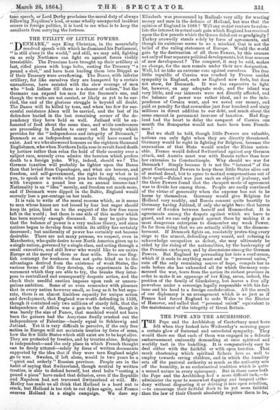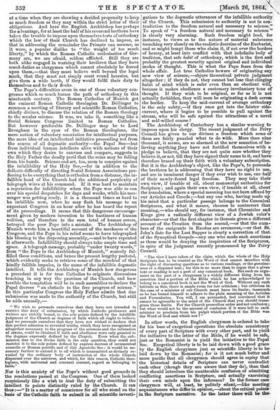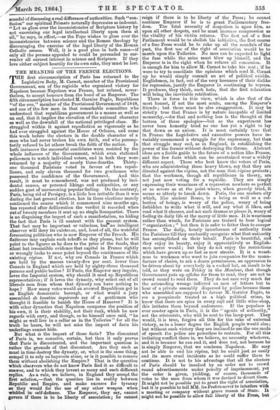THE POPE AND THE ARCHBISHOP.
THE Pope and the archbishop of Canterbury must have felt when they looked into Wednesday's morning paper a certain glow of fraternal and sacerdotal sympathy. They would there see that each of them was engaged in a delicate embarrassment eminently demanding at once spiritual and worldly tact in the handling. It is comparatively easy to deal. either with the faithful or with open heretics. That meek chastening which spiritual fathers love so well to employ towards erring children, and in which the humility sets off the pastoral authority as much as the authority sets off the humility, is an ecclesiastical tradition whieh is quite a second nature in every episcopacy. But in these cases, both the Pope and the Archbishop had a more difficult task,—to administer the spur to somewhat flagging and languid urtho- doxy without disgusting it or driving it into open rebellion, —to encourage their faithful flock to be yet more faithful than the law of their Church absolutely requires them, to be, z filled these conditions, and hence the present lengthy pastoral, "The view I have taken of the claim which the whole of the Holy- which evidently seeks to retrieve some of the mischief of that Scripture has to be treated as the Word of God cannot interfere with kindly fallible impulse, in the name of the infallible dogmatic the right of discussing questions as to various readings, or the genuine- intellect. It tells the Archbishop of Munich how dangerous nese of a disputed text ; for this is no more than to argue that a given text or reading is not a part of any canonical book. But such an argu- a precedent it is for true Catholics to originate discussions ment on the part of a clergyman is a widely different thing from his touching in any way the province of the Church, and how assertion that a portion of the Bible which he has acknowledged to- terrible the temptation will be in such assemblies to declare the belong to a canonical book is not the Word of God. Without any such Papal decrees "an obstacle to the free progress of science." latitude as this, there is ample room for fair criticism • but criticism in In this particular Congress the Holy Father admits that due the case of a minister of our Church must have its limits ; inasmuch Articles- submission was made to the authority of the Church, but still as he has bound himself to adhere to the plain meaning of the Articles- he adds uneasily,— cannot be agreeable to the mind of the Church that you should trans- " We wish to persuade ourselves that they have not intended to gross these limits. For the Church prescribes order and not confusion; restrict this duty of submission, by which Catholic professors and but what would not be the amount of confusion if it were left to each writers are strictly bound, to the sole points defined by the infallible minister to proclaim from his pulpit the Word of God and which not"
judgment of the Church as dogmas of faith which all ought to believe. ?
And we persuade ourselves that they have not wished to declare that In other words, the English clergyman is ordered to take this perfect adhesion to revealed truths, which they have recognized as altogether necessary to the progress of the sciences and the refutation for his base of exegetical operations the absolute consistency of errors, could be obtained if faith and obedience were only granted to of every part of Scripture with every other part, and to yield the dogmas expressly defined by the Church. Even when the sub- the initiative to the letter of the Bible, if he would be safe, mission due to the divine faith is the only question, they could not just as the Romanist is to yield the initiative to the Papal restrict it to the sole points defined by express decrees of cecumenical
councils or Roman pontiffs and of this Apostolic See : it would be ne-
cessary further to extend it to all which is transmitted as divinely re- by the English clergyman just as scientific liberty is to be- vealed by the ordinary body of instruction of the whole Church laid down by the Romanist; for is it not much better and- dispersed over the universe and which, for this reason, Catholic theo- more pacific that all clergymen should agree in saying that logians, with universal and constant consent, regard as belonging to the historical details of Scripture can never contradict faith." each other (though they are aware that they do), than that Nor is this anxiety of the Pope's without good grounds in they should introduce the unutterable confusion of admitting the resolutions passed at the Congress. One of them looked conflicting assertions in Scripture, and actually exercising suspiciously like a wish to limit the duty of submitting the their own minds upon the inference? In the former case intellect to points distinctly ruled by the Church. It ran clergymen will, at least, be politely silent,—like meeting thus:—" It is a matter of conscience for all who stand on the acquaintances who differin opinion —about the critical points at a time when they are showing a decided propensity to keep gations to the dogmatic utterances of the infallible authority as much freedom as they may within the strict letter of their of the Church. This submission to authority is not in con- obligations. And here the English Archbishop has perhaps tradiction to the freedom natural and necessary to science." the advantage, for at least the half of his reverend brethren have To speak of " a freedom natural and necessary to science" taken the trouble to impose upon themselves tests of orthodoxy is clearly very alarming. Such freedom might lead, for which the law of their Church has declined to impose, so instance to views as to the nature of material substance that in addressing the remainder the Primate can assume, as trenching very closely on the realistic doctrine of the Eucharist,- it were, a popular dislike to " the weight of too much and so might tempt those who claim it, if not over the borders liberty," by which the Roman Catholic ecclesiastics of Ger- of heresy,. at least into conflict with that indefinite body of many are, we are afraid, seldom afflicted. Still they are tradition, that safe habit of orthodoxy, which is the first and. both alike engaged in warning their brethren that they have probably the greatest security against original and individual creed-duties as clergymen which cannot absolutely be forced modes of thought. This is what the Pope fears from the upon them,—that they must believe well beyond the legal whole affair. Let true Catholics beware of originating any mark, that they must not simply coast round heresies, but new view of science,—abjure theoretical private judgment give them a wide berth, if they would fulfil their duty to altogether ; if they do not, they cannot but lose that clinging- But however preferable Dr. D011inger may be to Lord The Archbishop of Canterbury has a similar warning to Brougham in the eyes of the Roman theologians, the impress upon his clergy. The recent judgment of the Privy mere notion of voluntary association for intellectual purposes, Council has given to our divines a freedom which some of the mere idea of an intellectual initiative proceeding not from them are fairly puzzled what to do with. More than nine the source of all dogmatic authority—the Papal See—but thousand, it seems, are so alarmed at the new sensation of be- from individual human intellects alive with notions of their lieving anything they have not fortified themselves with a own which they desire to canvass and compare, suggests to pledge to believe, that they are not quite sure whether they the Holy Father the deadly peril that the reins may be falling believe it, or not, till they have signed their name to it, and have- from his hands. Science and art, too, seem to conspire against therefore braced up their faith with a voluntary subscription. the infallibility of the Holy See,—for in addition to the But it is the Archbishop's object, like the Pope s, to persuade delicate difficulty of directing Social Science Associations pro- the brethren he is addressing that they have no right to use fessing to be everything that is orthodox from a distance, the in- and are in imminent danger if they ever wish to use, one half- fallible head of the Church had the additional perplexity of of their newly-found legal freedom. They may take their telegraph wires at his command. If it was hard to maintain own view, if tenable at all, about manuscript authorities for a reputation for infallibility when the Pope was able to con Scripture ; and again their own view, if tenable at all, about over his special despatches for days and weeks, while his mes- the translation, where a special meaning has not been affixed by senger was getting ready, it is a thousand times as hard to our Articles and Creeds .—but any one who, having made up be infallible now, when he may flash his message to an his mind that a particular passage belongs to the Canonical expectant Congress hi an hour after he has heard the report Scriptures, and what it means, chooses to controvert that of its proceedings. It seems that this dangerous encourage- meaning,—who should say, for instance, that Chronicles and ment given by modern invention to the hastiness of human Kings give a radically different view of a Jewish ruler's volition, and therefore to the sum total of human errors, character—or that the first chapter in Genesis gives a different- betrayed the poor Pope into a mistake. The Archbishop of account of the Creation from the second,—or that the num- Munich wrote him a beautiful account of the meekness of the bore of the emigrants in Exodus are erroneous,—or that St. Congress, and the Pope in his relief seems to have telegraphed John's date for the Last Supper is clearly a correction of that his blessing to the dispersing assembly,—and to have repented of the Synoptical Gospels—any one who made such assertions- it afterwards. Infallibility should always take ample time and as these would be denying the inspiration of the Scriptures, space. A telegraph message, probably "under twenty words," in spite of the judgment recently pronounced by the Privy from "the Pope to the Archbishop of Munich," scarcely ful- Council.
and Formularies. You will, I am persuaded, feel convinced that it which portion of the Bible was
scandal of discussing a real difference of authorities. Such "con- fusion" our spiritual Primate naturally deprecates as indecent. "Let us gloss over the inconsistencies of Scripture history by not exercising our legal intellectual liberty upon them at all," he says, in effeet,—as the Pope wishes to gloss over the inconsistencies between science and the Roman theology by discouraging the exercise of the legal liberty of the Roman Catholic sawn.. Well, it is a good plan in both cases—if only all the persons appealed to could be persuaded to sur- render all earnest interest in science and Scripture. If they love either subject heartily for its own sake, they must be lost.
































 Previous page
Previous page